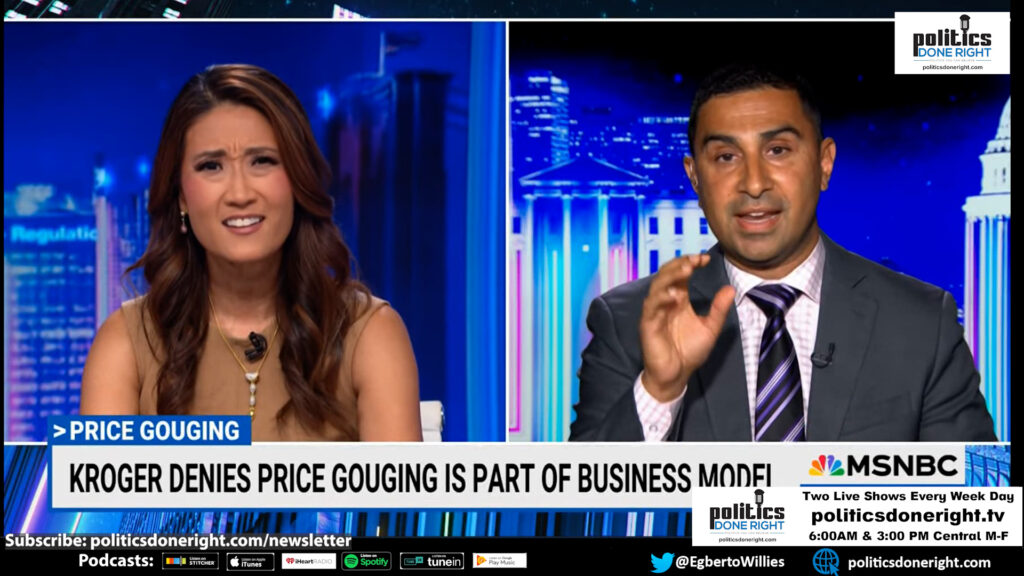Corporate greed has been exposed where it counts, in courts where corporations must generally be more truthful. Corporations, not Kamala Harris or Joe Biden, are responsible for inflation. Faiz Shakir, former Bernie Sanders advisor, nails it.
Do not blame Joe Biden and Kamala Harris for inflation.
Podcasts (Video — Audio)
The persistent narrative attributing inflation to the policies of President Joe Biden and Vice President Kamala Harris ignores substantial evidence pointing to a different source: corporate greed. This viewpoint, widely perpetuated by some conservative media outlets, oversimplifies the complex economic realities and fails to acknowledge the crucial role of corporate practices in driving up prices. Contrary to these claims, there is compelling evidence that inflation has been significantly exacerbated by price gouging and anti-competitive practices among major corporations.
The Corporate Influence on Inflation
The debate over inflation often becomes a battleground for political rhetoric rather than a discussion grounded in economic facts. Critics of the Biden administration frequently assert that government spending and policies are to blame for rising prices. However, this narrative does not align with the evidence emerging from various investigations and legal proceedings, consistently highlighting corporate misconduct as a major factor in inflation.
One of the most glaring examples of this issue is the role of large corporations in manipulating prices to their advantage. Recent investigations and lawsuits have revealed that many companies have exploited their market power to engage in price gouging, significantly inflating the costs of everyday goods. For instance, during a recent court case involving the merger of grocery giants Kroger and Albertsons, it was disclosed that Kroger had raised prices on staple items like milk and eggs more than necessary. This practice, often referred to as “greedflation,” involves increasing prices beyond what is justified by the underlying costs, thus directly contributing to higher inflation for consumers.
Government Efforts to Address Corporate Malfeasance
The Biden administration’s response to these practices has been proactive and significant. By challenging anti-competitive mergers, such as the proposed Kroger-Albertsons deal, the administration aims to prevent the consolidation of market power that would allow corporations to manipulate prices further. This action underscores a broader commitment to ensuring market competition, which is essential for keeping prices in check and protecting consumers from exploitative practices.
Additionally, the administration has supported efforts to crack down on price fixing in other sectors. For example, recent actions by the Department of Justice and the Federal Trade Commission have targeted practices by major oil companies and landlords that artificially inflate prices. The DOJ’s lawsuit against RealPage, which provides algorithmic pricing tools to landlords, revealed that these tools were used to facilitate price fixing among landlords, thus raising rental costs artificially.
The Broader Economic Context
The argument that inflation is solely the result of government policies ignores the broader economic context in which inflation occurs. Inflation is influenced by various factors, including supply chain disruptions, geopolitical events, and fluctuations in global commodity prices. The COVID-19 pandemic, for example, has caused significant disruptions in supply chains, leading to shortages and increased costs in many sectors. While government spending can influence inflation on the edges, it is the corporation that, above and beyond supply and demand, has pricing power, especially for items the consumer must have.
Even problems like supply chain disruptions caused by pandemics, war, hurricanes, strikes, and more are the direct result of corporations’ ineptitude. Corporations save money by employing slave labor or cheap labor overseas, which exacerbates shortages from these shocks. They use just-in-time inventory, which prevents the mitigation of supply chain shocks. They further increase inflation (read corporate greed) with excessive profits. And, of course, they do not reinvest appropriately in either employees or assets. As such it is safe to say 100% of inflation must be left at the corporation’s door.
Economic theory and empirical evidence suggest that monopolistic and oligopolistic markets, where a few large players dominate, are more prone to price manipulation and higher prices. Companies with little competition have more leeway to raise prices without fear of losing customers to competitors. This lack of competition is a critical factor in the current inflationary environment, as demonstrated by the corporate practices highlighted in recent investigations.
Conclusion
The notion that inflation is primarily the result of the Biden administration’s policies is a misleading oversimplification that fails to account for the significant role played by corporate greed. Evidence from ongoing investigations and legal actions shows that major corporations have engaged in price gouging and anti-competitive practices that have exacerbated inflation. Moreover, corporate ineptitude penalizes not the corporations but the customers.
In light of this, it is crucial for public discourse to accurately reflect the complexities of inflation and recognize the role of corporate practices in driving up prices. Misattributing inflation to government policies distorts the issue and undermines efforts to address the true sources of economic strain. Understanding the interplay between corporate behavior and inflation can lead to more informed discussions and effective solutions for managing inflation and ensuring a fair economic environment for all.

